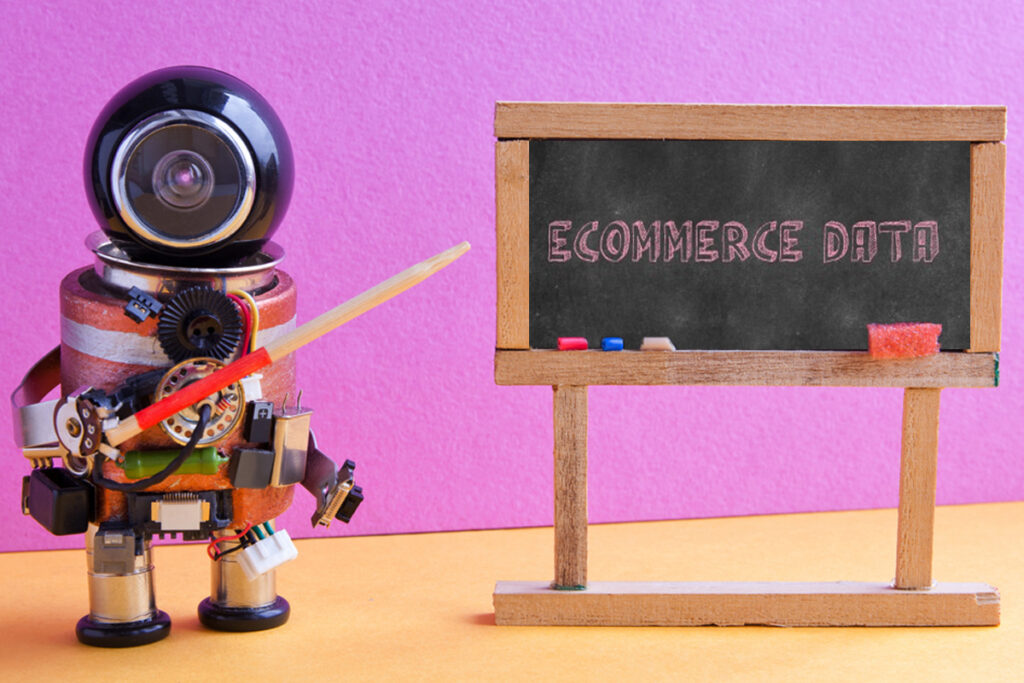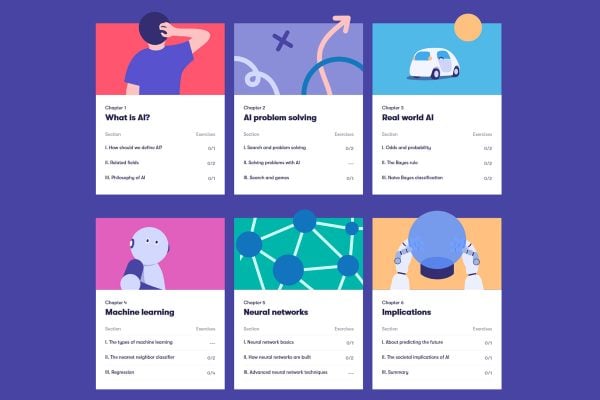 Chris from Chris Turton Ecommerce is an ecommerce and marketplace consultant passionate about understanding how online businesses tick. He writes from experience and tries to answer questions from sellers to improve and share his knowledge. Today, Chris shares an update on AI, machine learning & automation and how they apply to ecommerce data:
Chris from Chris Turton Ecommerce is an ecommerce and marketplace consultant passionate about understanding how online businesses tick. He writes from experience and tries to answer questions from sellers to improve and share his knowledge. Today, Chris shares an update on AI, machine learning & automation and how they apply to ecommerce data:
Over a year has passed since Chris Dawson produced Tamebays original Position Paper on AI and machine learning in ecommerce. 12 months on and some of the latest innovations in ecommerce and website marketplaces have to be seen to be believed.
Machine Learning and How It Could Enhance the Buying Behaviour of Humans
The world we now live in is driven by data. We can gain an insight into almost anything by using data that has been mined by fast-acting algorithms that detect patterns and behaviours. When it comes to ecommerce, this kind of data is imperative to the success of businesses and so, more and more is being achieved when it comes to utilising the power of Machine Learning.
Through the mining of internet data, many ‘AI based’ sales startups are now adopting a new approach whereby they attempt to identify patterns and behaviours that will allow them to identify who their next buyer will be. This is achieved by acting upon social media activity and interaction, through identifying specific discussions and what people are talking about. At this point, businesses can then identify prospective buyers based on a vast amount of data including what they are searching for.
AI Can Create a Personalised Approach
Buyers and prospective buyers can relate to personalisation and so, when personalisation is adopted on a large scale, it can have a positive impact on sales. Through transforming a vast amount of data that relates to consumer behaviour, it then makes it possible for strategies to be tailored to these specific behaviours. This targeted approach works on the requirements and desires of buyers and the emotion that goes into the entire purchasing process. So, when cookies are stored, there are a plethora of ecommerce tools that can be utilised to present pages that are personalised to a level where specific products and content are presented to them based on their preferences and browsing behaviours as well as past purchases.
In fact, these tools now make it possible to create categories of buyers based purely on their behaviours. This makes it possible to create page layouts that target specific audiences with the sole purpose of increasing conversions and sales. Ultimately, this level of machine learning and the use of data actually creates an enhanced user experience. As a result, customers receive a service that they expect from retailers online and that leads to a more personalised experience from start to finish.
Predicting Business Decisions
In the past, business decisions could be considered to be loosely made on “what ifs” and “maybes” but now Artificial Intelligence is assisting with business decisions on many levels. Through machine learning, it is making it possible for business decisions to be made that are effective for businesses of any size. This also helps to reduce the expenses associated with labour costs while also reducing the overall cost per prediction.
These decisions can be vast and varied and so, these platforms utilise raw data sets and then answers questions that are based on the data used and so, they can identify how many products certain stores will sell over a select period or which audience are likely to show a high level of activity that relates to a certain product. All of this can be achieved in very little time and that can help businesses to save money because there is no longer a need to put teams of specialists and scientists in place to achieve the same results.
Voice Powered Shopping
Artificial intelligence is now beginning to make waves when it comes to voice-powered shopping. The number of voice-powered devices that have made their way into homes and business has increased exponentially because people are craving this level of interaction but also connectivity when it comes to shopping. Therefore, it is now more crucial than ever that businesses look beyond the user interface and how attractive their website looks by putting more of an emphasis on voiced-based searches. Users and shoppers are now more technologically advanced than ever before and they are pushing boundaries. They are the ones that are driving innovation because artificial intelligence and machine learning have to keep up with the way in which we now want to lead our lives. Users will experience a more personalised yet focused shopping experience if they can search for products or services by speech. As a result, websites will now need to consider becoming optimised for voice-based searches or run the risk of being completely overlooked by users.
AI Driven Pricing
Underpinning the success of business product pricing. Pricing a product at the right mark is based on data and insights and this is now assisted through the use of AI. Utilising machine learning algorithms, intelligent systems are now monitoring markets and how they are performing as well as the behaviours of consumers. This intelligence makes it possible for retailers to adjust prices accordingly. This price will enable retailers to monitor stock, find out how competitors are performing and help them to implement optimal prices that resonate with consumers.
This ability to effectively monitor through the use of AI will create a real focus around the way in inventory management is targeted. Through analysing vast amounts of data, businesses can make actionable decisions that are based on genuine insights.
Ecommerce is a constantly shifting landscape and consumers are now turning to online shopping, resulting in an ever-increasing rate on a daily basis. As this demand rises, retailers have to create strategies that enable them to manage competitors and prices. Focusing on market dynamics will enable them to shift their strategies and focus on taking an omnichannel approach, but this still puts a real emphasis on the analysis of market dynamics. Businesses will need to behave in a proactive way as opposed to a reactive way and that is where AI and machine learning will enable them to measure in minutes as opposed to weeks.
Using AI will make it possible to actively monitor dynamic data points at a rate that is far more efficient than that of humans. This creates an environment where businesses can make informed decisions and act in line with the relevant analysis and results that have been presented through artificial intelligence.
Improvements in Warehouse Management
Many large retailers are now turning to artificial intelligence to enhance management and efficiency. This is a particular technology that is not new but has been under-used. This has been put down to the lack of support provided to them but this is a changing environment. It is believed that there is going to be a significant increase in the use of warehouse and logistic robots. Companies are seeking a flexible approach that can be scaled up and that is where companies are now becoming more receptive to this new technology.
Artificial intelligence is assisting this growing trend through automated processes and many case studies are now proving how these solutions are now providing an exceptional return on investment. Along with this, artificial intelligence is now supporting significant growth in ecommerce.
As it currently stands, the logistics robot market is going through a strong growth period. Companies are now replacing fixed infrastructure as well as outdated processes with robotic solutions that bring with them a flexible approach that can help to meet the increasing demands of the modern ecommerce world.
AI is Unlocking Automation
The traditional, controlled environments that have been apparent in warehousing and logistics for so long are becoming a thing of the past. Automation is now being delivered by artificial intelligence as well as deep neural networks and machine learning. These are capabilities that have held automation back but now it is helping to free automation to the point where more and more businesses are choosing to implement automation as a viable solution.
In the past, large retailers with large volumes of stock have found automation to be a difficult solution but new software is not making it possible to implement it and use it on a larger scale while achieving tangible results at the same time.
Large retailers such as Amazon are now driving the industry forward. They are adopting machine learning and artificial intelligence in order to gain consumer insights while providing a streamlined service. With the use of chatbots, warehouse automation and virtual assistants, the customer experience is now heavily influenced by artificial intelligence and the technology that supports it. All of this feeds into the need for businesses to create focused strategies while reducing costs and improving organisation and management efficiencies.
Ecommerce Developers Creating Tailored AI Applications
Artificial intelligence is now considered to be the future of ecommerce and that is resulting in many developers creating their own AI applications. This is made possible using platforms such as Microsoft’s Azure.
Currently, businesses are now investing in systems that utilise face recognition technology that makes it possible to identify the products of competitors, enabling them to make the relevant improvements to images associated to their selling platforms such as eBay or Amazon using key elements such as ASIN’s, EAN or UPC Barcodes.









